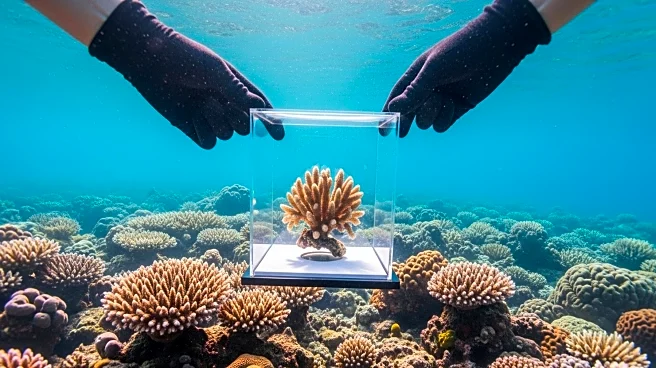What's Happening?
Elvira Alvarado, a Colombian marine biologist, is spearheading efforts to rescue endangered coral reefs off the coast of San Andrés, Colombia. Utilizing in-vitro fertilization (IVF), Alvarado and her team collect coral eggs and sperm, fertilize them in a laboratory, and transplant them to existing reefs. This technique, pioneered by Australian scientist Peter Harrison, aims to regenerate coral faster than they die due to bleaching, disease, and rising ocean temperatures. Alvarado's work is crucial as coral reefs provide essential ecosystems for marine life and protect shorelines from erosion. Despite the challenges posed by climate change and diseases like Stony Coral Tissue Loss Disease, Alvarado remains committed to restoring these vital marine habitats.
Why It's Important?
Coral reefs are critical to marine biodiversity, supporting around 4,000 fish species and protecting coastlines. The decline of these ecosystems due to bleaching and disease threatens marine life and local economies reliant on tourism. Alvarado's IVF approach offers a potential solution by fostering more resilient coral varieties. This method could mitigate the impact of environmental stressors, preserving marine biodiversity and sustaining economic activities such as diving and snorkeling. The success of these efforts could serve as a model for global coral conservation initiatives, highlighting the importance of innovative scientific approaches in combating ecological challenges.
What's Next?
Alvarado's team will continue their work on San Andrés, focusing on collecting and fertilizing coral during their annual spawning period. The coral hatchlings will be nurtured in seaside nurseries before being transplanted back to the reefs. The ongoing research aims to develop coral varieties that are more resistant to heat and stress, potentially leading to more sustainable reef ecosystems. As Alvarado mentors a new generation of marine biologists, her legacy of coral conservation is expected to persist, ensuring continued efforts to combat coral mortality and promote reef restoration.
Beyond the Headlines
The ethical dimension of Alvarado's work lies in the preservation of marine ecosystems that are vital to global biodiversity. Her efforts underscore the importance of scientific innovation in addressing environmental crises. The cultural impact is significant, as her work inspires young scientists, particularly women, to engage in marine biology and conservation. Long-term, these initiatives could shift public perception towards greater environmental responsibility and awareness, fostering a global movement for sustainable marine practices.









